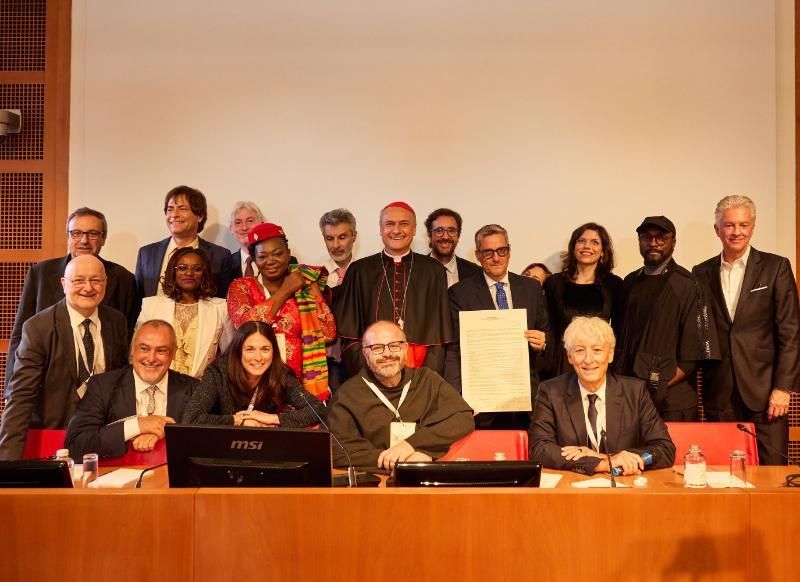Dr Abeba Birhane joins world leaders at AI summit at the Vatican
Posted on: 19 September 2025
Dr Birhane, Director of the AI Accountability Lab (AIAL) in the ADAPT Research Ireland Centre at the School of Computer Science and Statistics in Trinity, recently took part in the gathering on AI and the future of humanity at the World Meeting on Human Fraternity.
The expert group issued a Declaration focused on drawing red lines and highlighting how AI can be developed to better support humanity.
Dr Birhane was joined by a small but select group of world leaders in the AI space, including Geoffrey Hinton, the “godfather of artificial intelligence”; Max Tegmark from the Massachusetts Institute of Technology; Joshua Bengio, Stuart Russell, Yuval Noah Hariri, Jimena Viveros; and Marco Trombetti.
The group also included a face perhaps more familiar to millions around the globe as pop icon Will.i.am offered his insights as the head of FYI.AI and a supporter of computer science education in Los Angeles.
In 2023 Dr Birhane was named to TIME’s inaugural TIME100 AI list, which highlighted 100 experts at the forefront of understanding how AI is reshaping the world. She is globally recognised as a leader in her field and has regularly presented research that underlines the need for rigorous testing of AI systems before they are released into the world highlighting how vulnerable individuals and minority groups are often discriminated by AI.
 Dr Birhane, second from left, second row, at the AI element of the World Meeting on Human Fraternity.
Dr Birhane, second from left, second row, at the AI element of the World Meeting on Human Fraternity.
“A future where human dignity, justice, peace, kindness, care, and rights and freedoms for all serve as the north stars that guide AI development and use is possible," says Dr Birhane.
"But that future can’t appear out of thin air and without intentional tireless work, continual dialogues, and most importantly, confronting ugly realities including big tech and government use of AI and infrastructure to power genocide and enable mass surveillance. The Declaration we produced and presented to Pope Leo XIV is an important move towards this future."
With that broad theme in mind, those at the summit discussed the risk of the digital divide between countries with access to AI and those without.
Participants urged concrete local and international initiatives aimed at developing new forms of social philanthropy and supporting the most vulnerable segments of the population. The working group also urged meaningful measures for accountability, particularly of large corporations, big tech companies, and governments that are developing and deploying AI systems with little guardrails.
Another key theme was the need for more robust, clear regulation of AI’s use and the establishment of international norms and governance systems. Pope Leo XIV also participated in the discussion and reaffirmed the position of the previous pope regarding the establishment of a single agreement on the use of artificial intelligence.
